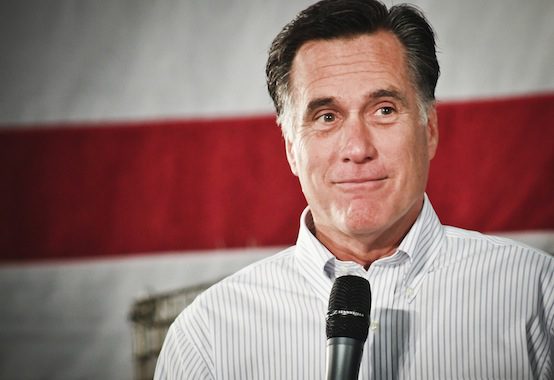Why Romney Is Losing

The presidential race may finally be turning decisively against Mitt Romney. The latest Gallup poll shows President Barack Obama leading Romney 50 percent to 44 percent, just six days after they were tied at 47 percent apiece.
In the commentariat, Romney’s well publicized self-inflicted wounds have received most of the blame. Certainly the former Massachusetts governor is a flawed candidate and has run an even worse campaign. But was it really that unreasonable for Romney to assume that Obama’s economic record would make him a one-term president?
Unemployment has been at least 8 percent for over 40 months and would be even worse if record numbers of Americans weren’t dropping out of the labor force entirely. Joblessness exceeded 10 percent even after the enactment of an $800 billion stimulus package.
The unemployment rate has actually risen in 26 states, including battleground states where Obama is currently leading. The economy grew by just 1.7 percent in the second quarter of 2012, down from 2 percent during the first three months of the year. Real median household incomes fell by over 8 percent since 2007, when the recession began.
All this has occurred with the Federal Reserve committed to near-zero interest rates indefinitely and before a probable increase in income tax rates. Obama has said he will not sign an extension of the 2001 and 2003 tax cuts for upper income earners, and is now signaling he may only preserve the middle-class tax cuts for a year.
Throw in attacks on U.S. embassies and escalating anti-American violence in the Middle East, and Obama can be said to be doing a fairly convincing Jimmy Carter impression. Yet outside the pages of a few optimistic conservative publications, no one expects an election result like 1980’s.
Of course, Romney is no Ronald Reagan. His campaign evokes images of Bob Dole’s 1996 comment: “I’m willing to be another Ronald Reagan, if that’s what you want.” But Romney’s biggest problem is the most recent Republican president: George W. Bush.
The fact that both the recession and the financial crisis began under Bush has complicated Romney’s economic case against Obama. Obama can always argue that whatever problems remain are the lingering aftershocks of the Bush downturn, and that he has led America out of the recession.
There was a risk for Obama that this strategy would fail. By blaming Bush, the president might look like he is evading responsibility. Many voters like Harry Truman’s dictum “the buck stops here.” Pointing out that the recession was over could have irritated voters who are still unemployed and struggling in an economy that is barely growing.
Yet in June, Gallup found that 68 percent of the American people still blamed Bush for the country’s economic problems while only 52 percent blamed Obama. That poll was taken before Bill Clinton reminded appeared at the Democratic National Convention to remind them who was president the last time the economy was booming. Clinton notably appears in the Obama economy-themed campaign ads, saying the electorate should stick with the incumbent’s plans.
The Clinton-Bush contrast hurts Romney when making arguments for his own policy proposals. Romney is campaigning on tax cuts. But Clinton raised taxes before the 1990s economic expansion, while Bush cut them before the 2007 recession.
This is obviously simplistic economic analysis. All they really prove is that the Clinton-era 39.6 percent tax rate wasn’t high enough to strangle an Internet boom and the 35 percent Bush top tax rate wasn’t low enough to forestall a financial meltdown. The 2001 Bush tax cuts were not well structured to promote growth, but the 2003 round was.
The Clinton tax increases were imposed on favorable economic conditions and particularly robust growth didn’t occur until 1997. Obama would repeat them in a weaker economy. Moreover, Democrats believed the Clinton tax hikes would stimulate the economy by reducing the deficit and lowering interest rates – not exactly the same as the theory behind Obama’s more classically Keynesian approach.
But the surface plausibility is more than sufficient to help Obama’s argument and hurt Romney’s. Obama is proposing Clinton-like policies, while Romney wants to return to the failed Bush ideas that created the economic mess in the first place.
Bush is a problem for Romney on foreign policy as well. At a time when questions should naturally be raised about Obama’s Libya intervention and policy of engaging the Muslim Brotherhood in Egypt, Romney is limited to hawkish chest-beating and Bush-era sloganeering.
Former Bush advisers have complained that Romney isn’t hawkish enough when it comes to the war in Afghanistan and the “forward strategy of freedom.” But how many people who haven’t personally signed a Project for a New American Century petition would be more likely to vote for Romney if he pledged to keep American soldiers in Afghanistan longer?
Obama’s foreign policy failures have been many (though they have not generally been a result of him not being interventionist enough). But again the basic contrast with Bush is clear: one president launched wars of choice that seemed endless; the other wound down those wars and refused to commit boots on the ground for his new ones.
It is hard to condemn Obama for his failed nation-building exercise in Afghanistan if the voters believe you want to continue the Afghan project and wage new wars in Iran and Syria. The case that Romney, as a risk-averse businessman, would actually be more restrained is weakened by the Bush record and continuing Bush rhetoric.
If Romney does go down to defeat, it won’t be his fault entirely. Obama will have once again beaten George W. Bush. Romney’s biggest campaign mishap may not have been any of the famous gaffes, but rather his failure to distance himself from Bush.
W. James Antle III is editor of the Daily Caller News Foundation and a contributing editor to The American Conservative. Follow him on Twitter.
Comments